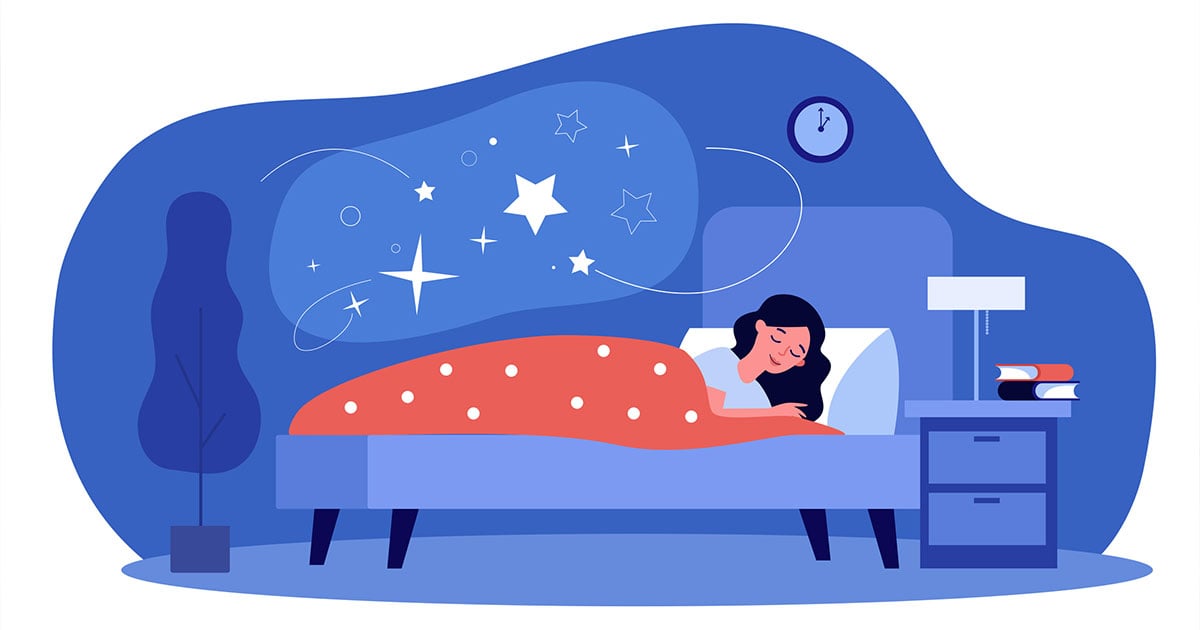
Does your mind race every time you lay down to go to bed? Do you have restless nights where you keep waking up? Moderate medical cannabis use is linked to improved sleep quality. However, the results are in the preliminary stages and inconclusive. More research is needed.
Cannabinol (CBN) is a relatively unknown cannabinoid known as one of the most sedative compounds in the cannabis plant. Is there research to back up this claim? Can it be used as a sleep aid? Here is what you need to know about CBN’s effect on sleep.
What Is CBN?

CBN is a minor cannabinoid found in very minimal amounts (under 1%) in cannabis plants. CBN is a byproduct of THC. Prolonged exposure to heat, air, and light converts THC to CBN. Over time, THC levels decrease, and CBN levels increase.
Compared to THC’s intoxicating high, CBN is mildly intoxicating. This minor compound is associated with improved sleep and other health benefits, including anti-inflammatory, pain-relieving, anticonvulsant, and appetite-stimulating effects.
How Does CBN Work in the Body?
It’s believed that cannabinoids interact with the body’s endocannabinoid system (ECS). The ECS is a broad network of chemical signals and endocannabinoid receptors (CB1 and CB2) responsible for regulating appetite, pain, stress, energy, metabolism, memory, mood, sleep, and more. Cannabinoids like CBN can have several effects on the mind and body.
CBN has a minimal binding affinity with CB1 receptors and a stronger affinity with CB2 receptors. CB1 receptors are associated with pain perception, motor activity, and other central nervous system functions. CB2 receptors are found mainly in the peripheral immune system.
Does CBN Have Sedative Effects?
Industry publications and cannabis companies promote CBN’s sedative effects, but is there weight to the claims that this natural medicine can help you have a good night’s sleep, or is it all hype?
According to Steep Hill Labs, a cannabis testing laboratory, “Of all the cannabinoids, CBN appears to be the most sedative. Not only is it sedative, but it also takes very little to do the job. The consumption of 2.5mg to 5mg of CBN has the same level of sedation as a mild pharmaceutical sedative, with a relaxed body sensation similar to 5mg to 10mg of diazepam.”
Studies: CBN and Sleep

Many consumers have used cannabis as an alternative or supplementary treatment for insomnia and other sleep problems. Early research suggests CBN may have some sleep benefits. So far, only one cited study has shown a link between cannabinol and improved sleep.
In a 1975 study, researchers tested the effects of oral THC and CBN on five men. Although THC made the men feel “drugged, drunk, dizzy, or drowsy,” CBN did not cause these effects. When THC and CBN were combined, the men reported feeling more of these effects. Randomized controlled trials are necessary to support CBN’s sedative effects claims.
Pre-clinical and clinical research investigating CBN’s effects go back to the 1970s and 1980s and is limited in scope. These human studies had a small sample size and lacked diversity in sociodemographic characteristics.
Although CBN has helped many with their sleep problems, more published clinical trials are needed to fully support sleep-related claims. Researchers are calling for more CBN research to understand its health benefits and side effects.
How CBN May Help Sleep Issues
Research may not wholly support the idea that CBN promotes good sleep, but this theory may have some truth. CBN may have several other therapeutic benefits not directly associated with sleep but may provide relief for users, improving their sleep.
Many patients have used CBN for anti-inflammation, pain relief, glaucoma relief, and anticonvulsant properties. CBN may provide significant relief for medicinal patients who may have trouble sleeping due to pain, inflammation, and other conditions.
CBN Products for Sleep
While the research on CBN and sleep remains inconclusive, numerous brands have cannabis products marketed as sleep aids. CBN is not as common as other cannabinoid products due to its low concentration in cannabis plants and lack of evidence demonstrating its sleep effects.
Cannabis consumers looking to try CBN for its sedative effects can find a wide range of products available, including CBN oils and tinctures, extracts and vape cartridges, pills and capsules, and a broad range of edibles.
Since CBN products are not regulated by the Food and Drug Administration (FDA), consumers should read the labels of every product and ensure that an independent lab tests them. Lab reports, also known as certificates of analysis (COA), show users the product’s cannabinoid concentration and ensure they do not have dangerous levels of mold, pesticides, residual solvents, or heavy metals.
How to Use CBN for Sleep

Despite the lack of research surrounding the effects of CBN, many users are flocking to this minor cannabinoid to treat their insomnia and other sleeping problems. While there is no substitute for good sleep hygiene, CBN may provide some sleep benefits.
There are many ways to take CBN. This cannabinoid is available in several different forms, including:
- Vape cartridges
- Tinctures
- Capsules and soft gels
- Edibles
Vaping CBN delivers faster-acting effects compared to other forms. Effects can begin 60 to 90 seconds after inhalation and last between 2-3 hours. However, inhaling cannabis vapor may pose respiratory risks.
Edibles such as CBN gummies and other oral consumption methods may provide longer-lasting effects than inhalation. Edibles can take effect in 60 to 90 minutes, and the effects can last between 6-8 hours.
The perfect CBN dosage will depend on various factors, including your tolerance to cannabis, weight, metabolism, and desired effects. Cannabis effects vary by person. Finding the right serving size for you may take some trial and error.
For best results, take the lowest CBN dose possible and gradually increase the serving size until you reach your desired effects.
CBN Side Effects
There is insufficient published evidence on cannabinol's adverse effects or medication interactions. No side effects are known, but that does not mean they do not exist. Consult with a physician before using CBN.
Does CBN Work for Sleep?
CBN has seen a surge of interest among cannabis consumers, especially for its sleep-inducing qualities. However, there is insufficient clinical evidence to back up these sleep-related claims. Randomized controlled trials are necessary to support CBN’s sedative effects. Consumers should consult with a doctor or other qualified health provider before starting a CBN regimen for sleep.


